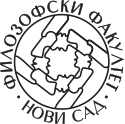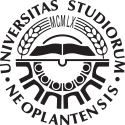15SRKS014 - Contemporary Methodology and Use of Technology in Teaching Serbian as a Foreign Language
| Course specification | ||||
|---|---|---|---|---|
| Course title | Contemporary Methodology and Use of Technology in Teaching Serbian as a Foreign Language | |||
| Acronym | 15SRKS014 | |||
| Study programme | Serbian Philology: Serbian as a Foreign Language | |||
| Module | ||||
| Type of study | second degree master academic studies | |||
| Lecturer (for classes) | ||||
| Lecturer/Associate (for practice) | ||||
| Lecturer/Associate (for OTC) | ||||
| ESPB | 6.0 | Status | ||
| Condition | - | Oblik uslovljenosti | ||
| The goal | Developing awareness of how technology can help learning and teaching; exploring the links between technology and current ideas on learning and teaching; conducting assessment, adaptation and design of teaching materials improved by technology. | |||
| The outcome | Students who complete this course successfully will be able to: demonstrate a comprehensive theoretical and conceptual basis and appropriate skills in the field of information technologies; demonstrate the skills in exploring new ideas, strategies and special tools for integrating information technologies into the curriculum; form and implement appropriate methods for teaching special groups of students; create awareness of the needs of different types of students and understand how to respond to them through the use of technology; compare and contrast alternative approaches with the use of information technologies in teaching. | |||
| Contents | ||||
| Contents of lectures | Technology as a teaching tool. Historical overview of educational technology development: Skinner's Programmed Teaching, CBT/CBL, CMC. Theoretical directions in the basis of education technologies: behaviorism, cognitivism, constructivism. Pedagogical basis of the use of interactive whiteboards (smart boards), smart phones, PowerPoint software and other specialized techniques. Integration of communication technologies in teaching (E-mail, SMS, instant messaging, VOIP, chat rooms etc.) and their pedagogical and psychological basis. The concept and realization of a virtual classroom. The future of using social networks in teaching. Ethical and legal issues related to the use of information and education technologies. | |||
| Contents of exercises | Demonstrations of technologies, discussions, workshops, group work and practical tasks. Each class will contain a strong pedagogical component with emphasis on the practical application of the learned content. Students are expected to actively participate in teaching and share their everyday experiences in the use of various technologies. Students will be encouraged to give their contribution to the group blog on topics related to the module during the semester. | |||
| Literature | ||||
| ||||
| Number of hours per week during the semester/trimester/year | ||||
| Lectures | Exercises | OTC | Study and Research | Other classes |
| 2 | 2 | |||
| Methods of teaching | Lecturing, discussion, demonstration, problem solving methods, research methods. | |||
| Knowledge score (maximum points 100) | ||||
| Pre obligations | Points | Final exam | Points | |
| Activites during lectures | 10 | Test paper | ||
| Practical lessons | 10 | Oral examination | 60 | |
| Projects | 20 | |||
| Colloquia | ||||
| Seminars | ||||

